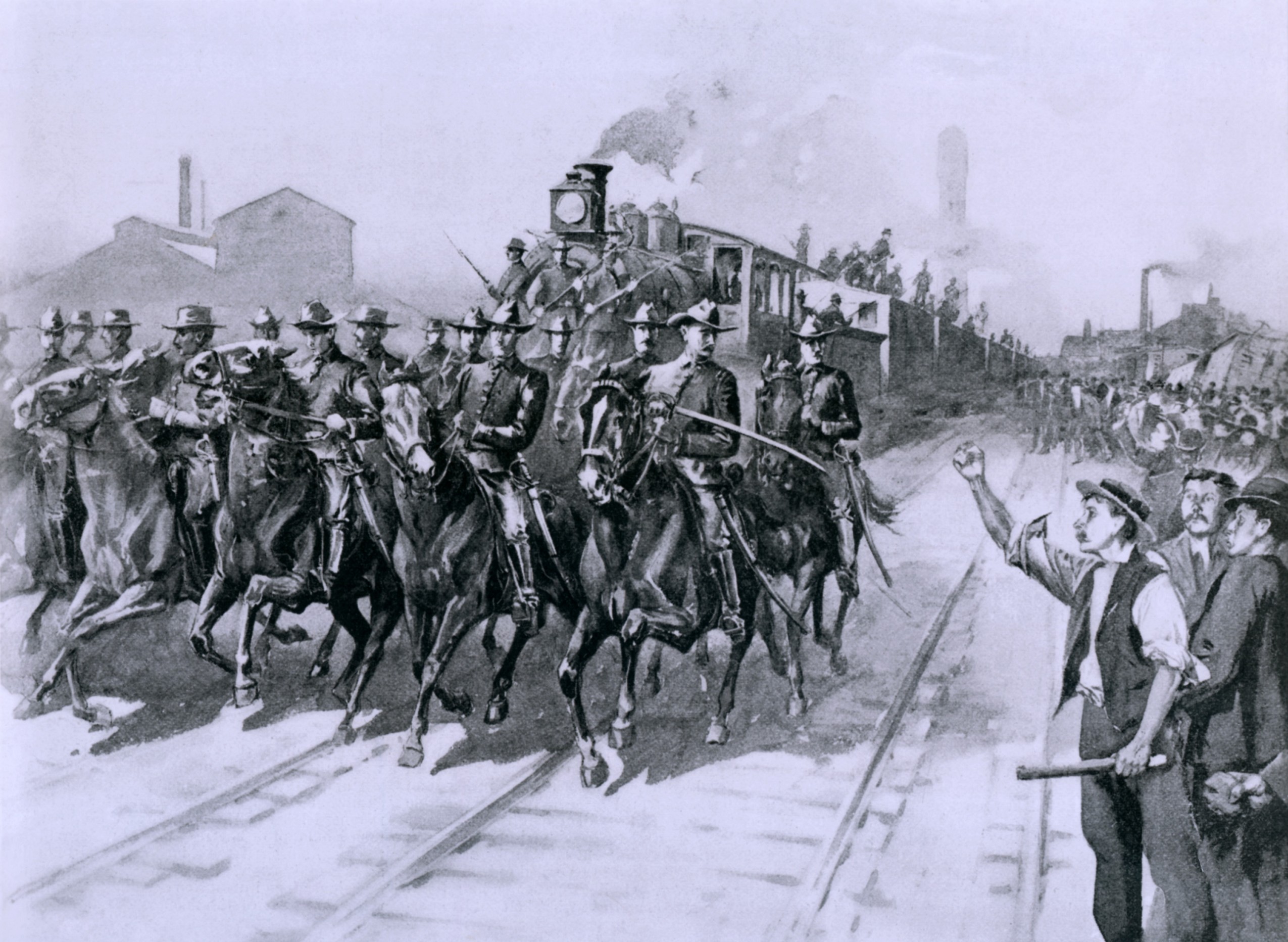The bloody history of Labor Day
Why this holiday commemorates struggle and death


A free daily email with the biggest news stories of the day – and the best features from TheWeek.com
You are now subscribed
Your newsletter sign-up was successful
Most people probably don't think of Labor Day as a holiday commemorating struggle and death. But that's what it used to be.
The period between the Civil War and the Great Depression was a time of massive upheaval: The industrial revolution swept in, and millions of Americans were forced to leave their farms and move to cities in search of work in the newly-formed rail, steel, textile, and shipping industries.
Economic policymaking was still ad hoc and primitive. Massive recessions regularly created mass poverty and threw enormous numbers of people out of work. The rules, both legal and social, were still being formed for how employers could treat employees, and how the wealth they all collectively produced would be distributed. Inequality soared to enormous heights by the end of the period. The minimum wage, the 40-hour work week, laws against child labor, and more were only instituted after pitched political combat. Unions were growing as the one avenue by which workers could fight for their interests, and the economy saw waves of regular strikes and work stoppages that would be unheard of today.
The Week
Escape your echo chamber. Get the facts behind the news, plus analysis from multiple perspectives.

Sign up for The Week's Free Newsletters
From our morning news briefing to a weekly Good News Newsletter, get the best of The Week delivered directly to your inbox.
From our morning news briefing to a weekly Good News Newsletter, get the best of The Week delivered directly to your inbox.
Sometimes, the battles were literal: Employers and politicians were not shy about busting unions with police forces and hired enforcers. Riots, deaths, and bombings were not uncommon.
The first inklings of America's Labor Day took shape in 1882, when the Central Labor Union (CLU) met in September in New York City for a labor festival. It's disputed who first proposed the idea. It might have been Peter McGuire, a co-founder of the American Federation of Labor (AFL), who was inspired by a parade in Toronto in 1872 in support of a strike against 58-hour work weeks. Other research points to Matthew Maguire, a machinist and member of the Knights of Labor. But somehow or another, the idea for a parade and yearly holiday to honor American workers was hatched.
The first parade of the new project was held in Manhattan on Sept. 5, 1882. It started out small, but then a band showed up, and workers' groups from various industries began to flow in. Eventually the parade swelled to 10,000. After that initial success, various state and municipal governments began naming an official day to commemorate labor.
Then a massive recession hit in 1893.
A free daily email with the biggest news stories of the day – and the best features from TheWeek.com
The job losses were devastating — and the frustration crystallized in a nationwide strike against the Pullman Company, a railroad car manufacturer and founder of one of the most infamous company towns in America.
Railroad baron George Pullman created his eponymous town in 1880 just outside Chicago. It was a model of capitalist feudalism, with workers offered housing in line with their position in the company. Residents worked for Pullman's company and their rent was automatically docked from their paychecks. They even banked at Pullman's bank. But Pullman's business plummeted when the recession hit. Hundreds were laid off and wages were deeply cut — yet rents in the town did not decline.
In response, 4,000 of Pullman's workers went on strike on May 11, 1894.
On June 26, the American Railroad Union — led by Eugene V. Debs — called for a supporting boycott. One hundred and fifty thousand railway workers in 27 states joined the strike, refusing to operate Pullman rail cars. The massive halt to the rail industry and the interruption of U.S. mail cars set off a national crisis. Congress and President Grover Cleveland, looking to save face, rushed through a bill declaring Labor Day a national holiday. Cleveland signed it on June 28, 1894. He was backed by the AFL — the more conservative portion of the labor movement — which threw the first official Labor Day parade that year.
But it was a brutally ironic gesture.
Six days later, under pressure from the furious leaders of the rail industry, and facing the virtual shutdown of U.S. mail trains, Cleveland invoked the Sherman Antitrust Act to declare the stoppage a federal crime. He sent in 12,000 federal troops to break the strike. Days of fighting and riots ensued, as strikers overturned and burned railcars, and the troops responded with violent crackdowns. Anywhere from a dozen to over 30 workers were killed before the strikers were dispersed and the trains restarted.
Debs was sent to prison, where he read Marx for the first time, setting him on the path to becoming arguably America's most famous socialist.
Cleveland and others picked the September date for Labor Day as a kind of alternative to May Day, which had by then arisen as the principal day of celebration for workers' movements around the world. On May 1, 1886, over 250,000 workers struck in Chicago, shutting down 13,000 businesses to demand a shorter work week for equal pay. After several days of peaceful protest, an unknown assailant threw a bomb at police in Haymarket Square on May 4. The police responded by firing into the crowd, killing scores of people.
So it's understandable that many on the left view Labor Day as a cynical ploy — a lazy apolitical three-day weekend, which distracts from the remembrance of when workers fought and died for the basic humane decency of a shorter work week.
But you could also look at Labor Day as a remembrance of a time when the labor movement was a force to be reckoned with. Since the heyday of the New Deal, American membership in labor unions has collapsed. Millions of workers in modern service industries face capricious employment, low pay, and dismal conditions. Inequality has returned to its pre-Great-Depression levels, and the shared prosperity of the era immediately after the New Deal is a distant memory. Even the 40-hour work week is falling by the wayside.
All of which makes Labor Day ripe for reclaiming, in the name of some long-unfinished business.
Jeff Spross was the economics and business correspondent at TheWeek.com. He was previously a reporter at ThinkProgress.
-
 Why are election experts taking Trump’s midterm threats seriously?
Why are election experts taking Trump’s midterm threats seriously?IN THE SPOTLIGHT As the president muses about polling place deployments and a centralized electoral system aimed at one-party control, lawmakers are taking this administration at its word
-
 ‘Restaurateurs have become millionaires’
‘Restaurateurs have become millionaires’Instant Opinion Opinion, comment and editorials of the day
-
 Earth is rapidly approaching a ‘hothouse’ trajectory of warming
Earth is rapidly approaching a ‘hothouse’ trajectory of warmingThe explainer It may become impossible to fix
-
 The pros and cons of noncompete agreements
The pros and cons of noncompete agreementsThe Explainer The FTC wants to ban companies from binding their employees with noncompete agreements. Who would this benefit, and who would it hurt?
-
 What experts are saying about the economy's surprise contraction
What experts are saying about the economy's surprise contractionThe Explainer The sharpest opinions on the debate from around the web
-
 Late night hosts joke about Trump's forced exodus from Facebook to blog
Late night hosts joke about Trump's forced exodus from Facebook to blogSpeed Read
-
 Fox News admits Biden doesn't actually want to cancel meat. Late night hosts pounce anyway.
Fox News admits Biden doesn't actually want to cancel meat. Late night hosts pounce anyway.Speed Read
-
 The death of cities was greatly exaggerated
The death of cities was greatly exaggeratedThe Explainer Why the pandemic predictions about urban flight were wrong
-
 Manhattan D.A. will stop prosecuting sex workers, not their clients, pimps, or sex traffickers
Manhattan D.A. will stop prosecuting sex workers, not their clients, pimps, or sex traffickersSpeed Read
-
 John Oliver explains personal bankruptcy, how credit card lobbyists and lawyers make it much worse
John Oliver explains personal bankruptcy, how credit card lobbyists and lawyers make it much worseSpeed Read
-
 John Oliver explores problems with U.S. nursing homes and long-term care, suggests you pay attention
John Oliver explores problems with U.S. nursing homes and long-term care, suggests you pay attentionSpeed Read
